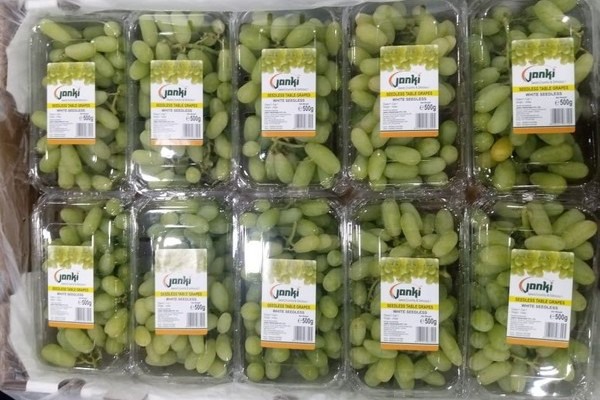At the moment, the export of grapes from India is mostly going to markets in Asia. Sagar Deore, director for Indian produce exporter Janki Freshyard Private Limited expects that trade to Europe will start after the New Year: “This year's Indian table grape season got underway early, and fruit is already being packed primarily for traditional markets in Asia, the Middle East, and Russia. By early January 2024, Indian grape packaging is anticipated to begin for European markets.”
The grape season in India became more challenging last week, as many regions experienced heavy rains and hailstorms, Deore explains. “The season was predicted to be eventful and promising in terms of both quality and quantity until last week. However, earlier this week, unseasonal rain and hailstorms struck many grape-growing regions, causing damage to numerous orchards, particularly in the Nashik district. A number of orchards have some damage, although not all of them.”

“The EL Nino climate trend has caused India to have less rainfall than usual, which could lead to a water deficit by April/May 2024, towards the conclusion of the grape season. As a result, the late-season portion may experience some difficulties. Apart from that, the weather has been favourable for farming. Until last week, we had no problems like unexpected rain during the season,” Deore states.
“The majority of grape-growing regions enjoy a pleasant temperature, plenty of sunlight and a clear sky. Consequently, there has been an increase in higher-quality fruit with a longer shelf life, the usage of pesticides has been lowered, and eventually a relatively lower cost of production for the farmer has been realized. This year's anticipated 20% decrease in sea freight costs compared to last year will aid in keeping logistics costs under control.”
Despite the recent weather, production volumes and export volumes should increase this year, Deore expects. “We intend to raise our volume for packing, given the fruit volume that is available and the positive feedback we received from clients in the previous season. In order to increase our, we have also strengthened our facilities and brought on other new growers to our company. Since most consumers are purchasing South African fruit now, it is a little early to draw conclusions about the demand. Aside from Asian nations, our significant volume is sold to the markets in Europe and the United Kingdom.”

Prices might go down a bit in 2024, when more grapes become available: “Until now the prices are very firm, almost similar to what we had last season during this point of the season. In January 2024, more orchards will be ready for harvesting and prices may go downwards slightly after that, due to the higher fruit inflow. Even though the season is just getting started, we have high hopes for it. This year, we'll expand both the number of markets and our volumes exported,” Deore concludes.
For more information:
Sagar Deore
Janki Freshyard Private Limited
Cell/WhatsApp: (+91) 913 024 1585
Email: [email protected]
www.jankiglobalexport.com










